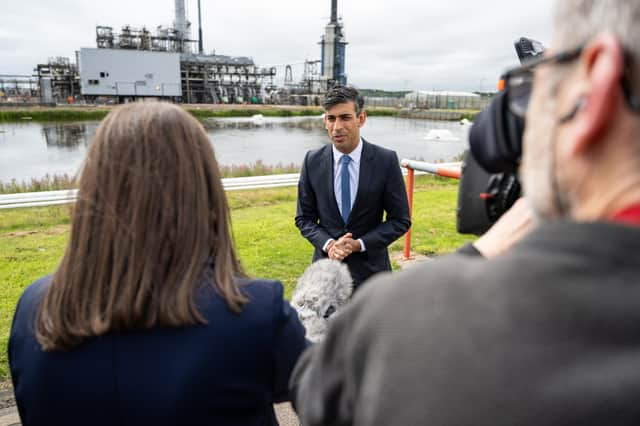Rosebank oil field approval adds to concerns Rishi Sunak doesn't take climate change seriously – Scotsman comment


In 2021, the International Energy Agency laid out a “narrow” but “viable” path for the world to hit net-zero emissions by 2050. It would require, the IEA stressed, “an unprecedented transformation of how energy is produced, transported and used globally” and “no new oil and natural gas fields”.
So the decision to grant consent to the vast Rosebank oil field off Shetland requires some explaining. The North Sea Transition Authority said it had taken “net-zero considerations into account”, but that is not the same as saying Rosebank is in accordance with a credible decarbonisation strategy. The UK Government needs to show its workings and demonstrate that its 500 million barrels of oil can be accommodated within Britain’s legally binding net-zero target.
Advertisement
Hide AdAdvertisement
Hide AdThose arguing against Rosebank include the usual radical left-wingers but also far more serious figures, like Lord Deben, the former Conservative Cabinet minister and former chair of Climate Change Committee, the government’s independent advisers. Writing in The Scotsman in July, he cited the IEA's advice against opening up new supplies of oil and said: “We won’t need more North Sea oil. Our present production will naturally decline as our needs decline… The world will have oil for all our declining needs and it is simply foolish to invest in what will be stranded assets.”
This is a key point. In addition to climate change arguments, there is a business case for reducing our economy’s reliance on a technology that is gradually becoming out-dated. For “stranded assets” read “stranded jobs”. The livelihoods of North Sea workers should be protected, but that will not be achieved if the oil and gas industry is run full tilt until the point of a major global collapse. Instead, there should be a transition, so that as demand and production decline, new jobs are created in the renewable sector.
At last year’s COP27 climate summit, Rishi Sunak stressed that helping the global fight against climate change was “economically right” and that “climate security goes hand in hand with energy security”. “Putin’s abhorrent war in Ukraine and rising energy prices across the world are not a reason to go slow on climate change. They are a reason to act faster,” he added. “Because diversifying our energy supplies by investing in renewables is precisely the way to insure ourselves against the risks of energy dependency.” Quite right.
Today, Energy Security Secretary Claire Coutinho said that Rosebank’s oil would make the country “more secure against tyrants like Putin”. However, its extra emissions also mean that another sector will have to decarbonise more quickly. Worryingly, ministers deployed the bogus argument that new UK oil and gas would help reduce greenhouse gases because its production results in fewer emissions than some imports. The problem is that there’s nothing to stop Rosebank’s fossil fuels from being exported overseas to the highest bidder.
A better argument is that the tax revenue raised from Rosebank can be used to fund the transition. However, before accepting that it can be accommodated in the UK’s carbon budget, the figures need to be exposed to expert scrutiny.
Following Sunak’s talk of “maxing out” North Sea oil and gas and his recent decision to delay several climate targets, the sense is of a government paying little more than lip service to climate change in the hope that voters can be deluded into thinking we can have it all: a thriving fossil fuel industry and net zero. And, on the global stage, of the UK, once a climate leader, turning back and urging other nations to follow us, not into the future but the past – a direction of travel our children and grandchildren may well regret.
Comments
Want to join the conversation? Please or to comment on this article.
